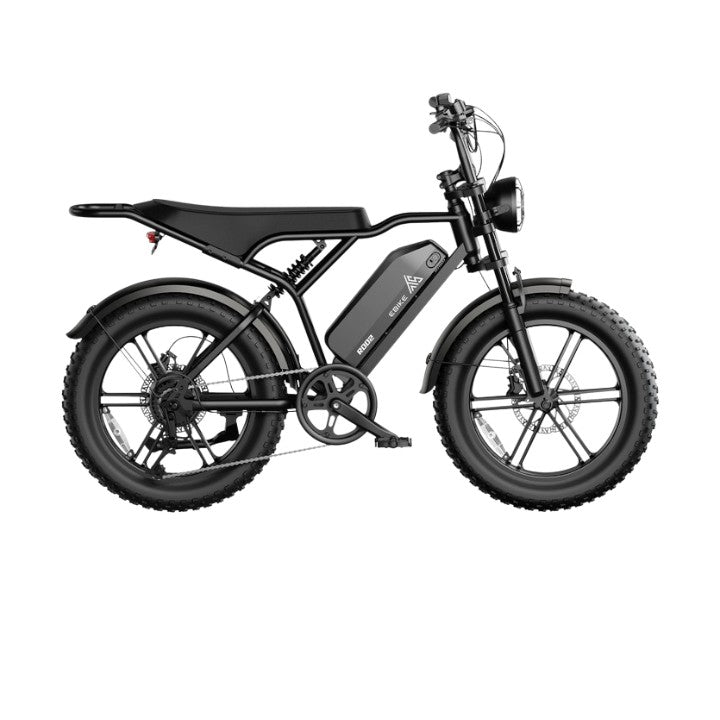In 2025, U.S. residents can unlock savings on electric bikes through a variety of state tax credits and rebate programs, alongside a pending federal tax credit offering up to $1,500 or 30% off e-bike purchases under $8,000. These incentives, available in many states including California, Colorado, New York, and Oregon, make owning eco-friendly TST EBike models like the 26-inch and 27-inch more affordable and accessible.
What Are the Federal and State E-Bike Tax Credits and Rebates Available in 2025?
The federal E-BIKE Act, pending approval, proposes a refundable tax credit of 30% (up to $1,500) for electric bikes priced below $8,000, available once every three years per individual. Many states have implemented their own rebate programs, offering direct discounts at purchase or post-purchase vouchers, with amounts ranging from $300 to $2,000 depending on income and bike type. These programs aim to promote sustainable transportation and reduce emissions.
Which Electric Bikes Qualify for 2025 Tax Credits and Rebates?
To qualify, electric bikes must:
- Have a motor rated under 750 watts
- Be classified as Class 1, 2, or 3 with functional pedals
- Meet UL 2849 safety certification standards
- Cost less than $8,000
TST EBike’s 26-inch model, designed for rough terrains, and the 27-inch model, ideal for daily commuting and mountain biking, both meet these criteria, making them excellent candidates for available incentives.
How Do State Incentive Programs Differ Across the U.S.?
States vary widely in rebate amounts, eligibility, and application processes. For example:
- California offers up to $2,000 vouchers for income-qualified residents, with additional trade-in incentives.
- Colorado provides rebates up to $1,500, with Denver offering up to $1,700 for cargo models.
- New York grants $1,000 instant rebates plus additional trade-in credits.
- Oregon launched a $500 rebate program, with higher amounts for low-income residents.
- Minnesota offers tiered rebates covering 50–75% of the purchase price, up to $1,500.
Other states like Connecticut, Hawaii, Maryland, Massachusetts, and Texas have also introduced varying incentives, often prioritizing low-income residents.
Chart: Selected State E-Bike Rebates and Tax Credits in 2025
| State | Rebate Amount | Eligibility Criteria | Application Method |
|---|---|---|---|
| California | Up to $2,000 | Income-qualified residents | Point-of-sale rebates |
| Colorado | $450 - $1,700 | All residents, higher for cargo bikes | State tax credit & rebates |
| New York | $1,000 + trade-in rebates | Income limits apply | Instant rebates |
| Oregon | $500 - $1,200 | Low-income residents prioritized | Pending legislative approval |
| Minnesota | 50-75% of cost, up to $1,500 | State residents, income-based | Department of Revenue |
Why Is It Important to Understand Eligibility and Application Processes?
Eligibility often depends on income limits, residency, bike price, and model certification. Some states require purchases from approved dealers or submission of specific documents. Understanding these details ensures you maximize savings and avoid delays or denials. Many states now offer point-of-sale rebates, simplifying the process by applying discounts immediately at purchase.
How Can Consumers Maximize Savings on TST EBike Purchases?
Consumers should:
- Research both federal and state programs applicable to their location.
- Confirm that the TST EBike model (26-inch or 27-inch) meets eligibility criteria.
- Purchase from authorized dealers participating in rebate programs.
- Keep all purchase documentation and certifications.
- Stay updated on program changes and deadlines.
Combining federal and state incentives can significantly reduce the cost of high-quality, eco-friendly TST EBike models.
Buying Tips for Taking Advantage of E-Bike Tax Credits and Rebates
- Verify Eligibility: Confirm your income level, residency, and bike model meet program requirements.
- Choose Certified Models: Opt for TST EBike’s 26-inch or 27-inch models that comply with UL 2849 and class standards.
- Purchase from Approved Retailers: Ensure dealers participate in rebate programs for point-of-sale discounts.
- Keep Documentation: Save receipts, certifications, and rebate forms for smooth application.
- Act Promptly: Some programs have limited funds or application windows.
In recent years, electric bicycles (e-bikes) have surged in popularity, prompting numerous bike and even car manufacturers to allocate more resources toward their development and production. To support this growing trend and promote sustainable transportation, several U.S. states have introduced rebate programs offering residents financial incentives for new e-bike purchases.
Which Electric Bikes Qualify for Tax Credits?
To qualify for tax credits, an electric bike must be a new Class 1, 2, or 3 model with a motor under 750 watts, functional pedals, and UL 2849 safety certification. The purchase must be from an approved retailer, and the bike's price should not exceed $8,000.
To be eligible for tax credits, an e-bike must meet specific criteria:
-
Motor Power: The motor must be less than 750 watts.
-
Classification: The e-bike should be classified as Class 1, Class 2, or Class 3 and must have operable pedals for propulsion.
-
Certification: According to the E-BIKE Act, the e-bike must cost less than $8,000 and be equipped with fully operable pedals, a saddle or seat for the rider, and an electric motor of less than 750 watts designed to assist in propelling the bicycle or tricycle under certain conditions.
What is the E-BIKE Act Consumer Tax Credit?
The E-BIKE Act proposes a 30% refundable federal tax credit, up to $1,500, for new electric bikes priced under $8,000. Eligible individuals can claim this credit once every three years, while joint filers may claim it twice in the same period.
Introduced in 2021 and reintroduced in Congress in 2024, the Electric Bicycle Incentive Kickstart for the Environment (E-BIKE) Act aims to provide a refundable tax credit for e-bike purchases. If passed, it would offer a 30% tax credit, up to $1,500, for e-bikes priced under $8,000. This credit would be available to individuals once every three years, with joint filers eligible to claim it twice in the same period. Additionally, many states, including California, Colorado, and New York, now adjust income thresholds annually for inflation. Notably, most 2025 programs, such as those in Massachusetts and Oregon, require dealers to apply rebates directly at the point of sale.
As we explore the various rebates and tax credits offered across U.S. states, it's essential to remember that these incentives differ by location. Be sure to research the specific programs applicable to your state to maximize your savings.
2025 State-Specific E-Bike Incentives
In 2025, several states offer e-bike incentives:
-
California: Up to $2,000 vouchers for income-qualified residents purchasing eligible e-bikes.
-
Minnesota: Rebates covering 50–75% of e-bike costs, up to $1,500, for purchases from approved vendors.
-
Texas: $500 rebates for e-bikes bought in designated air quality zones.
-
Washington, D.C.: Vouchers up to $2,000 for low-income residents purchasing cargo e-bikes.
Different states in the USA offer varying rebates and incentives for e-bike purchases, aiming to promote sustainable transportation. The rebate amounts and eligibility criteria vary widely, depending on state-specific policies and programs. Some states provide a few hundred dollars per e-bike, while others offer more generous incentives of $1,000 or more. Remember to research the policies in your specific state to see what rebates may be available. This section leads you to explore the e-bike rebate amounts across different states to help you maximize your savings.
Oregon
In January 2025, Oregon proposed House Bill 2963, sponsored by Representative Mark Gamba. This bill aims to provide eligible residents with a $1,200 rebate for the purchase of an electric bike and related equipment. The program specifically targets individuals receiving government assistance, ensuring that low-income Oregonians have access to sustainable transportation options. Learn more here
Minnesota
Minnesota's Electric-Assisted Bicycle Rebate program is designed to reduce the cost of new e-bikes for residents. The program offers rebates covering 50% to 75% of the purchase price, up to a maximum of $1,500. Residents must apply through the Minnesota Department of Revenue and purchase their e-bike from participating approved retailers. The application process for 2025 is expected to reopen in early summer. Learn more here
Washington D.C.
The District's E-Bike Incentive Program provides vouchers of up to $1,500 toward the purchase of an e-bike, along with a helmet and bicycle lock. Applicants must be District residents over 18 years old. Preferred applicants include those enrolled in programs such as SNAP, TANF, Medicaid, or the DC Healthcare Alliance. It's important to note that applicants must be approved before purchasing an e-bike, as retroactive rebates are not permitted. Learn more here
New York
New York State is considering the "Ride Clean" program, which would offer a 50% rebate to residents purchasing an e-bike, up to a total rebate of $1,100. This initiative is modeled after the existing "Drive Clean" rebate program for electric vehicles and aims to encourage the adoption of clean transportation alternatives. Learn more here
California
California's E-Bike Incentive Project provides point-of-sale incentives of up to $2,000 to support the purchase of new electric bicycles. Funded by the California Air Resources Board (CARB), the project prioritizes low-income residents and those living in disadvantaged communities. The initiative reflects California's commitment to promoting clean transportation and reducing air pollution. Learn more here
Colorado
In 2025, the City and County of Denver adjusted their e-bike rebate program to focus on income-qualified individuals and those in need of adaptive e-bikes. Additionally, the State of Colorado offers an e-bike tax credit, providing a $450 discount on the purchase of an e-bike, available to all residents. Residents are encouraged to explore these opportunities to take advantage of the available incentives. Learn more here
Atlanta, Georgia
Atlanta's E-Bike Rebate Program is an equity-focused initiative designed to increase transportation options for city residents by providing affordable access to e-bikes. The program offers instant rebates for various classes of e-bikes, including standard e-bikes, e-cargo bikes, and e-trikes. Eligible e-bikes must have two or three wheels and fully operable pedals, with an electric motor of 750 watts or less. Conversion kits and used e-bikes are excluded from the program. Learn more here
Comparative Overview of State Incentives
| State | Rebate Amount | Eligibility Criteria | Application Process |
|---|---|---|---|
| Oregon | $1,200 | Residents on government assistance | Pending legislative approval |
| Minnesota | 50-75% of cost, up to $1,500 | State residents | Apply via Department of Revenue |
| Washington D.C. | Up to $1,500 | District residents over 18 | Pre-approval required |
| New York | 50% of purchase price, up to $1,100 | All state residents | Pending program implementation |
| California | Up to $2,000 | Low-income residents | Point-of-sale incentive |
| Colorado | $450 tax credit | All state residents | State tax credit application |
| Atlanta, GA | Instant rebates (amount varies) | City residents | Apply through city program |
Maximizing Your Benefits
To fully leverage these incentives:
-
Research Local Programs: Beyond state initiatives, some cities and utilities offer additional rebates. Check with local authorities and utility companies for potential programs.
-
Understand Eligibility Requirements: Each program has specific criteria, such as income limits or approved e-bike models. Ensure you meet these requirements before applying.
-
Stay Updated: Legislation and programs can change. Regularly check official sources or consult with local e-bike retailers for the latest information.
Conclusion
Investing in an e-bike not only contributes to a sustainable future but can also be financially advantageous, thanks to various tax credits and rebates available in 2025. By understanding and utilizing these programs, you can make your e-bike purchase more affordable and join the movement toward greener transportation.







Leave a comment
All comments are moderated before being published.
This site is protected by hCaptcha and the hCaptcha Privacy Policy and Terms of Service apply.